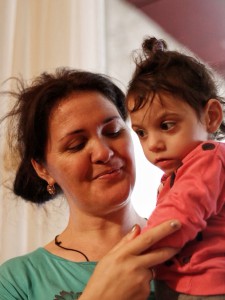Overcoming hardships caused by the Georgian-Abkhazian war
12:16, June 20, 2017 | News, Own news
The Georgian-Abkhazian war ranges among the bloody events in the Caucasus region in the early 1990s. While Abkhazia declared its independence after the war of 1992-93, so far it has been recognized only by Russia, Nicaragua, Venezuela, Nauru and Vanuatu, as well as partially recognized South Ossetia and unrecognized Transdniestrian Moldovan Republic.
Like any war, this war was also accompanied by ethnic cleansing, murders and mass displacement.
Some of the persons displaced from Abkhazia settled in the city of Tskhaltubo, Georgia, in buildings that once served as hotels and health resorts.

Currently 24 families live in this building.
While 24 years have passed after the end of the war, around 1200 families still live in those buildings. The buildings are in poor condition: damp walls, broken windows, dark and cold corridors, dripping ceilings. Despite these harsh conditions, people continue to live and hope that one day everything will be fine.
40-year-old Marianna has lived in such conditions for almost 25 years. She lives in a two-room apartment in a half-destroyed building with her 2 children and a young granddaughter with health problems. Marianna’s parents live in a tiny room on the other side of the dark and narrow corridor in the same building; one of the walls in their room is fully covered with water flowing from the upper floor. They turned to competent authorities many times, but the problem is still unsolved.

Photo by Robin Stria
Marianna could hardly hold back her tears during the talk and complained: “Life is very hard here, no one helps us, they help only in case of death, but in some cases do not help even then. The state gives each of us a monthly allowance of 45 Georgian lari (about 8500 AMD), but it’s not enough to meet our daily needs and costs.”
To solve her financial problems, Marianna leaves for work abroad to Turkey and it is the only way in which she can earn a living for herself, her children and her parents.
Despite the hard living conditions, Marianna and her parents have no wish to change their place of residence. “We already had to leave our house once and now we’re too old and have no wish to start it all again”, says 69-year-old Mrs. Nadezhda.
Things are different in Gali district, which is an administrative unit of the Republic of Abkhazia. Gali is the only district in Abkhazia populated mostly with ethnic Georgians. Despite this, the ruling authorities are made up of ethnic Abkhazians who always use pressures and discrimination against ethnic Georgians. And the situation worsened after the Russian-Georgian war in 2008.
The main problem concerns issuance of passports: in the past few years, no Russian passports have been issued to the population. Some of the Gali district inhabitants have no Russian passports with which they might cross the Abkhazian border. This in its turn violates freedom of movement. Most of the population in Gali district mostly maintains ties with Georgia: they prefer leaving for Tbilisi for education or treatment.
Maya considers restriction of free movement as a major problem “Borders should be opened and people should be granted freedom”, she says.
Maya is a Georgian, 26 years old. In 1992, as the war began, their family moved to Zugdidi city in Georgia. After the war, they came back to their family home. After leaving school, she continued her studies in Tbilisi. After 4 years of study, she again came back to Gali and now lives there with her parents.
In 2017, Maya and her sister set up a “Club for Intellectuals” for local children and young people. The project is quite new and they have got no funding so far, but some children are already members of the club and learn English.
“There are lots of problems and hardships, there are no jobs, but once a person wishes to overcome all the difficulties and find a job, they will succeed”, says Maya smiling when talking about everyday problems and difficulties.
Like thousands of others, in 1993 Guranda’s family also had to leave everything because of war and find a safer place. 25-year-old Guranda’s family moved from Sukhumi to Senaki town in Georgia and shortly after to St. Petersburg, Russia, where they lived 9 years. At the age of 11, Guranda, born in Sukhumi, again moved to Georgia but now to Tbilisi.
Despite numerous resettlements, lively and smiling Guranda can hardly remember the years of war and the hardships it caused. “I have never felt like a forcibly displaced person or a refugee. My parents and especially my mother did everything they could for my brother and me not to feel bad. I had a good childhood, I joined various groups and have always been active”, Guranda says.
As for the situation in Tskaltubo, Guranda notes: “People should be responsible, find strength, and move forward, accept the realty and live in it.”
Forcibly displaced persons find it difficult to overcome the problems caused by the war. They find it difficult to start a new life on the other side of the border realizing that they had to leave everything in their country. They need lots of effort not to get disappointed and to start a new life. Some of such people succeed in moving forward and changing their lives for the better, while others take almost no steps waiting for the wonderful day when they or their children will be able to return to their family home.
Author: Ani Ghambaryan
The Article was prepared within the 2-week research visit to Abkhazia and Georgia entitled ‘Youth Minorities in Everyday Reality’ organized by ‘NESEHNUTÍ’ Independent Social Ecological Movement based in the Czech Republic with the support of the Erasmus+ programme of the European Union.
